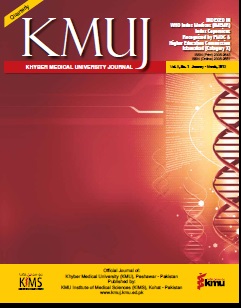COMPUTER USAGE AND ATTITUDES TOWARDS e-LEARNING AMONG FIRST-YEAR MEDICAL STUDENTS IN KARACHI, PAKISTAN
Main Article Content
Abstract
Objective: To find out the computer and internet infrastructure available, computerskills, current trend of using e-learning modalities among undergraduate students of Dow University of Health Sciences in Karachi, Pakistan.
Methodology: During January 2012, first-year medical students of Dow Universityof Health Sciences responded to an online questionnaire at the end of a 6-week e-learning Research module. The questionnaire examined attitudes and experiences about different modalities of e-learning, as well as attitudes about e-learning usage in medical curriculum apart from the computer and Internet infrastructure.
Results: Out of total 700 students, 436 students completed the online questionnaire.Majority of students (n=327; 75%) owned a personal computer or laptop, while 93 (21%) of students used a family-shared computer. Most of the students used either high-speed broad-band internet (n= 123; 28%) or wireless internet (n=193; 44%). Most of them (n=380; 87%) used internet to search for information. Facebook was used by 307 (70%) of students at least several times per week. Most of them (N=31; 73%) agreed that e-learning should play an important role in learning, while 259 (59%) agreed that web-based training should be made available to supplement face to face teaching.
Conclusion: Most of the students have necessary infrastructure and positive attitudes about e-learning. Findings of this study should help in planning and organizing special e-learning courses.
Keywords: e-Learning, Medical Students, Online Learning, Computer Based Learning
Article Details
Work published in KMUJ is licensed under a
Creative Commons Attribution 4.0 License
Authors are permitted and encouraged to post their work online (e.g., in institutional repositories or on their website) prior to and during the submission process, as it can lead to productive exchanges, as well as earlier and greater citation of published work.
(e.g., in institutional repositories or on their website) prior to and during the submission process, as it can lead to productive exchanges, as well as earlier and greater citation of published work.
References
Grant DM, Malloy AD, Murphy MC. A comparison of student perceptions of their computer skills to their actual abilities. J Information
Technol Edu 2009; 8(1): 141-60.
Anderson WL, Mitchell SM, Osgood MP. Comparison of student performance in cooperative learning and traditional lecture‐
based biochemistry classes. Biochem Molecular Bio Edu 2006; 33(6): 387-93.
Dalsgaard C. Social software: E-learning beyond learning management systems. European Journal of Open, Distance and E-Learning. 2006;(2).[cited: 2012 December 2} Available from URL: http://www.eurodl.org/materials/contrib/2006/Christian_Dalsgaard.htm
Link TM, Marz R. Computer literacy and attitudes towards e-learning among first year medical students. BMC Medical Education. 2006; 6(1): 34.
Sharpe R, Benfield G, Roberts G, Francis R. The undergraduate experience of blended e-learning: a review of UK literature
and practice: Higher Education Academy; 2006.Available from URL: http://www.heacademy.ac.uk/assets/documents/research/literature_reviews/blended_e-learning_exec_summary_1.pdf
Jawaid M, Ashraf J. Initial experience of e-learning research module in undergraduate
medical curriculum of Dow University of Health Sciences: Development and students perceptions. Pak J Med Sci 2012; 28(4): 591-6.
Ullah M, Khan MN. Attitude towards information
and communications technology among undergraduate students in Army Medical College: A survey. Pak Armed Forces Med J 2007; 57(3): 201-5.
Masood S, Khan RA, Waheed G. Computer
literacy among the medical staff at Avicenna Medical College and Hospital. Pak J Med Health Sci 2010; 4(3): 294.
Naz F, Malik KI, Zaman R, Younis S, Malik M. Use of internet by medical students in their basic and clinical skills. Pak J Med Res 2011; 50(1): 34-6.
Rosenberg MJ. E-learning: Strategies for Delivering Knowledge in the. McGraw-Hill Professional; London: 2001.
Schanze S. The use of concept mapping in the med:u project –e-learning in medical education. A tool for structuring complex
information and for testing learning performance. In: Meister DM, Tergan S, Zentel P (editors). Münster Evaluation of e-learning. Goals, methodological aspects, future. Waxmann; 2004: 171-187.
Wei FH, Chen GD. Collaborative mentor support in a learning context using a ubiquitous discussion forum to facilitate knowledge sharing for lifelong learning. Br J Educational Technol 2006; 37(6): 917-35.
Martín-Blas T, Serrano-Fernández A. The role of new technologies in the learning process: Moodle as a teaching tool in Physics. Computers & Education 2009; 52(1): 35-44.
Wang Q, Woo HL, Quek CL, Yang Y, Liu M. Using the Facebook group as a learning management system: An exploratory
study. Br J Educational Technol 2011; 43(3): 428-38.
Jawaid M. Web 2.0 and Medical Education: Are we utilizing the resource effectively? Pak J Med Sci 2011; 27(2): 242-3.
